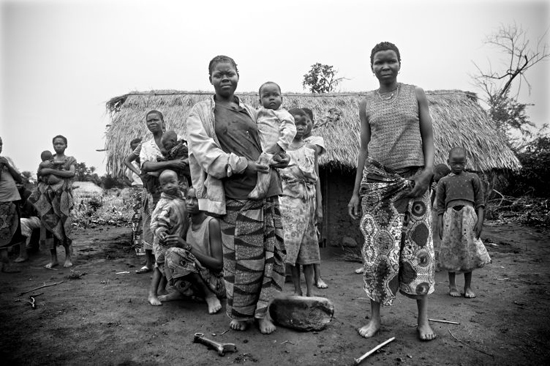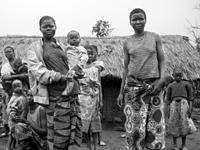"There’s still a lot of insecurity. Attacks, killings, armed offensives and kidnappings still run rife. The population lives in a constant state of tension, always ready to flee en masse at the slightest rumor of an attack by the rebels from the LRA."

DRC 2009 © Miguel Cuenca
A displaced family takes refuge at Matala camp in Faradje, Haut Uélé, in Orientale Province.
The areas of Haut-Uélé and Bas-Uélé in the northeast of the Democratic Republic of Congo (DRC) have been prey to violence and armed conflict since late 2008.
Pierre Kernen, who coordinated MSF’s activities in Niangara between August 2009 and April 2010, describes the situation for the populations in the region and the challenges to humanitarian aid.
How would you describe the security situation in the Uélés at the moment?
There’s still a lot of insecurity. Attacks, killings, armed offensives and kidnappings still run rife. The population lives in a constant state of tension, always ready to flee en masse at the slightest rumor of an attack by the rebels from the Lord’s Resistance Army or LRA.
To reach the populations cut off by insecurity, we send out teams to conduct mobile clinics whenever security allows.
Tens of thousands of people have been displaced over the last few months in different parts of Haut-Uélé and Bas-Uélé. People only have very limited access to medical care, except for those who have taken refuge in the main towns. In Niangara, one of the places where MSF works, we saw people who’d travelled between 50 and 60 km (30 and 40 miles) to get to the hospital. In the first three months of 2010, the surgical team at the Niangara hospital had already operated on nearly 150 patients, two-thirds the number of emergency operations carried out by MSF in 2009.
Apart from surgery, what are MSF’s main activities?
MSF mostly carries out medical and psychological programs in areas sheltering the displaced. In Niangara, where half of some 20,000 inhabitants are displaced, we support the general hospital and a primary health center. In Niangara, we carry out around 4,000 consultations and hospitalize 200 patients every month.
To reach the populations cut off by insecurity, we send out teams to conduct mobile clinics whenever security allows. After some serious and deadly attacks and huge new population movements, we ran mobile clinics in Tapili, to the west of Niangara, between January and March. The team regularly goes to Nambia, a settlement about 15 km (10 miles) north of Niangara and provides on average 200 medical and psychological consultations a day.
Psychological support is an important part of MSF’s activities.
It’s an essential part of what we do. The mental health programs not only target the direct victims of kidnappings and violence, but also the many people living in a state of constant fear. Some have lost their family, some have witnessed atrocities and find themselves all alone. And there are those who haven’t seen extreme violence firsthand but have fled far from home for fear of attacks and can’t provide for themselves or their families. In 2009, 416 people received psychological support from MSF in Niangara, either through individual consultations or collective sessions.




